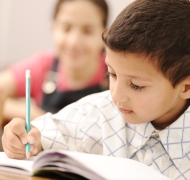27 February 2017
 The highly charged school funding debate is back on the national agenda after recent reports showing Australian children crashing down international education leader boards falling behind Kazakhstan and little positive return coming from considerable government investment in Indigenous education.
The highly charged school funding debate is back on the national agenda after recent reports showing Australian children crashing down international education leader boards falling behind Kazakhstan and little positive return coming from considerable government investment in Indigenous education.
Federal Education Minister, Simon Birmingham has described Australian students’ poor performance scoring below Kazakhstan in all four categories of the 2015 Trends in International Mathematics and Science Study (TIMSS) report as a “wake-up call”.
This was followed a few days later by the OECD’s 2015 Programme for International Student Assessment in Literacy, Numeracy and Science (PISA) which also shows Australian students falling behind their international contemporaries and another poor showing for Indigenous education outcomes in the 2017 Closing the Gap report.
University of South Australia Associate Professor in Applied Linguistics and international multilingual expert, Kathleen Heugh, says the realisation that Australian students now fall behind countries like Kazakhstan in their maths and science seems to be particularly irksome to many people.
But there are lessons for Australia from Kazakhstan’s swift adoption of multilingual education policies.
“Kazakhstan’s independence from the former Soviet Union in December 1991 is relatively recent and few commentators have paid attention to how an ambitious president is pushing the socio-economic and educational development of this country,” Assoc Prof Heugh says.
“Shortly after independence Kazakhstan’s education system changed from a mostly Russian only system to one that is bilingual Kazakh-Russian to ensure that each student would become proficient in both Kazakh and Russian and to ensure that previously marginalised Kazakhs were provided with equal access to quality education.
“Then in 2006 Kazakhstan President Nursultan Nazarbayev proposed gradual implementation of the "Trinity of languages" cultural project as part of his “New Kazakhstan in a New World" agenda.”
Assoc Prof Heugh says that with increasing physical and virtual mobility of people, governments in the vast majority of countries of the world, like Kazakhstan, recognise bilingual education is a minimum requirement for competent 21st century global citizens.
“The Australian government and education stakeholders need to recognise that educational competitiveness is now undeniably associated with students who are proficient in at least two languages,” she says.
“In international assessments TIMSS and PISA, the top and well performing countries or education systems (Shanghai, China, Korea, Singapore, Japan, Finland, Sweden and Kazakhstan) assume that students must, at the very least, become bilingual while at school.
“English dominant countries, including Australia, the UK and the USA are falling behind.
“Recent OECD and UNESCO reports have also found that it is not necessarily how much money is invested in education but rather the degree of government commitment to new education policy and the contribution of local, regional and national stakeholders that is important.
“The learning of a second (and even third) language to the level of bilingual (or trilingual) proficiency enhances mathematic and scientific thinking and contributes to what is called cognitive plasticity and metacognitive agility.
“If we are to turn around the disappointing data and disparities in student achievement in Australia we need an unambiguous commitment to building strong foundations in numeracy/mathematics as well as literacy.
“The development of literacy cannot be separated from the language or languages through which literacy is established.
“For most students, and most especially for vulnerable and marginalised students, literacy can only be well-established in a language that they use on a daily basis.
“In remote Australia, this language is unlikely to be English.
“The gap between Indigenous children and children with English as their home language will not close without strong bilingual programs that build on local knowledge in both local language and English,” she says.
“Unless the education sector focuses on teaching all children to read and write extended texts, including writing by hand, our children will continue to fall behind their international counterparts.
“Unless we respond to the ‘wake-up call’ swiftly, the cognitive advantage for students in a schooling system, such as those emerging in Singapore, China, Hong Kong, Korea, Japan, Estonia and Kazakhstan, has long-term socio-economic and political consequences for the country.”
Media contact: Katrina McLachlan mobile: +61 414972537 email: katrina.mclachlan@unisa.edu.au


